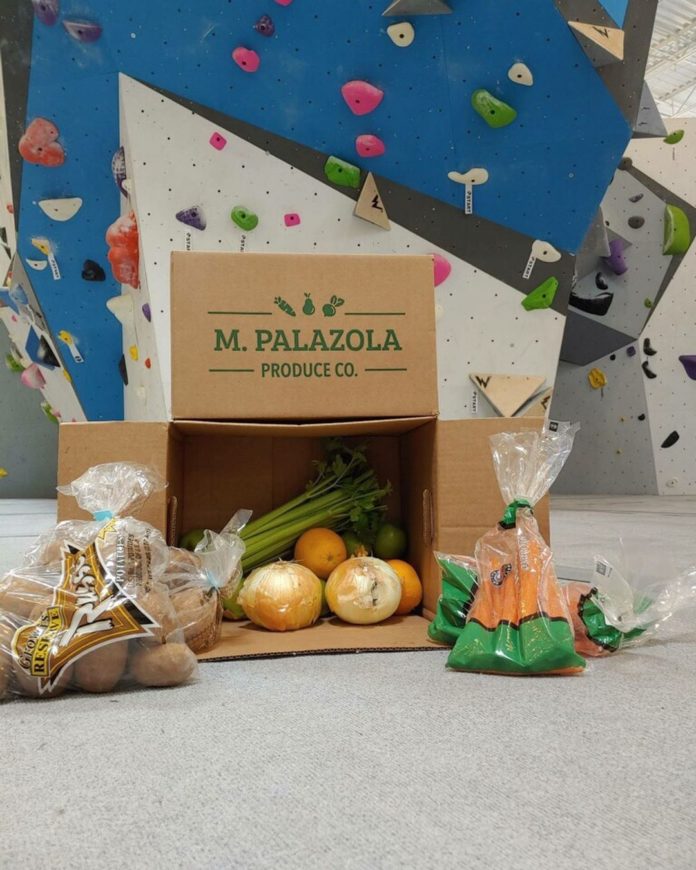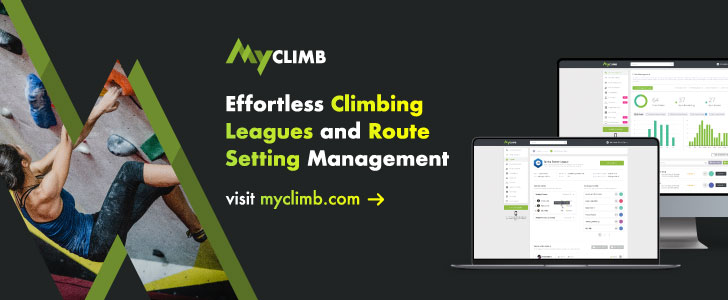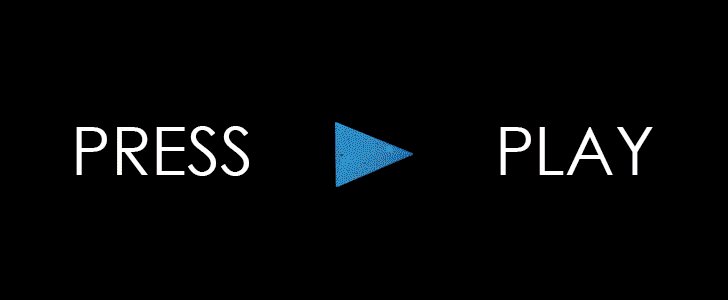Behind the Desk…is a series that interviews people who are part of the climbing industry—those who run companies, manage staff, create innovative new products, and operate gyms. While being closed for climbing during the Coronavirus (COVID-19) pandemic, the nonprofit climbing gym Memphis Rox has kept busy in the Soulsville community. So, CBJ reached out for a double interview with Jon Hawk and Daniel Arnold to learn about getting creative to support the most vulnerable in our wider communities.
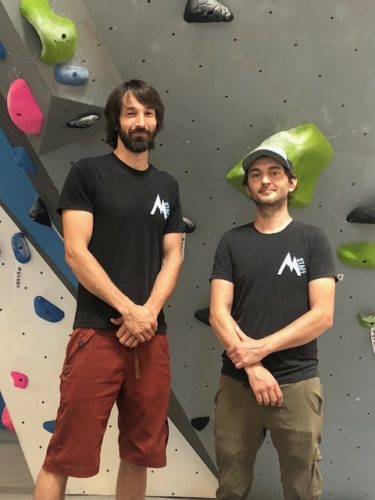
Name: Jon Hawk; Daniel Arnold
Title: Director of Operations; Training and Volunteer Coordinator
Gym: Memphis Rox
Location: Memphis, Tennessee
CBJ: Thanks for taking the time to explain your pay-as-you-can business model last year and sit down with us again. Could you walk me through some of the things you have been up to during this period?
Hawk: The gym looks a little different these days. We’re more of a production line, cranking out care packages, lunches and hand sanitizer. We greatly appreciate Armstrong Relocation Memphis, M. Palazola Produce and Sysco Foods for donating boxes to keep us going strong and getting these items out to those who need it. Since we closed the climbing gym, we have given out over 6,500 free lunches, 100 care packages (canned goods, trash bags, toilet paper, etc.), 120 hygiene packs (1-month supplies of toothbrushes, toothpaste, soap, deodorant, floss, etc.), 800 bottles of hand sanitizer (200 given out to the neighborhood, 500 sold and 120 sent to Native American tribes), 693 boxes of produce totaling 17,325 pounds (with a target of 1000 boxes in 3 weeks), and 160 masks.
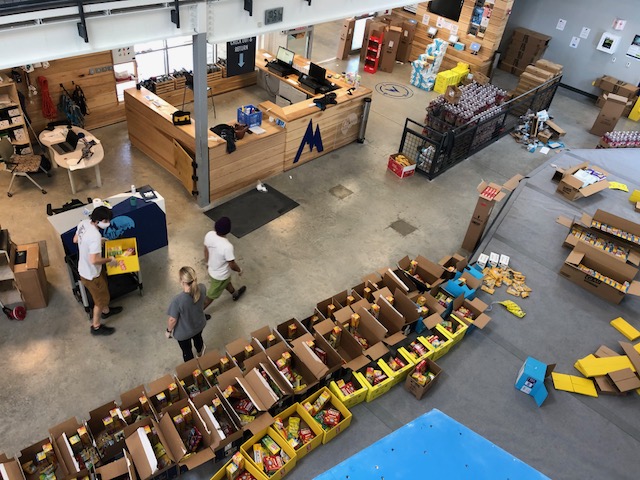
CBJ: Please tell me more about the background behind the donation to Native American tribes.
Hawk: The recording artist MILCK is familiar with our gym and was talking with some of her friends who are involved with charitable organizations. When she mentioned that we were bottling hand sanitizer, the conversation just came up that some of the tribes nearby don’t have running water. That was also the same week that CNN released an article about the explosion of Coronavirus among the Navajo tribe. We had some stock of hand sanitizer, so we shipped it out. Now it’s going to be an ongoing thing. We rallied a few donors to help cover the cost. I have about another 120 bottles to send out next week. It’s just rad to be able to help. I mean, these people don’t even have running water. How are they supposed to have proper hygiene and stop the spread of the virus if they don’t even have the basic essentials?
CBJ: It’s wonderful to watch Instagram videos like this one and see how Memphis Rox is continuing to support your local community in those ways. What resources have enabled you to do that?
Hawk: Two weeks into the quarantine, Vermico Smith, a friend of ours who runs a nonprofit called Kovae House, donated all sorts of goodies: boxes of Cheez-Its, Ziploc bags, trash bags, household goods, canned food, etc. We made hundreds of boxes of care packages and handed those out.
This time has been difficult for the nonprofit sector as well. As soon as the Coronavirus hit, their revenue streams took a hit too. Most of the charitable donation foundations and corporations have stopped giving grants during the pandemic. At a time when we needed help, a lot of organizations had to pull back. However, our tenacity to keep helping people has inspired some of the local foundations to give us what they can to continue to feed those in need.
Another local foundation saw that we didn’t give up and started giving us a $5,000 check every month to offset some of the bagged lunch food costs. We were also lucky enough to get the PPP loan. Unfortunately, that is about to end, so we are working on some fundraisers to keep as many people employed as possible until revenue streams get back to a normal pace.
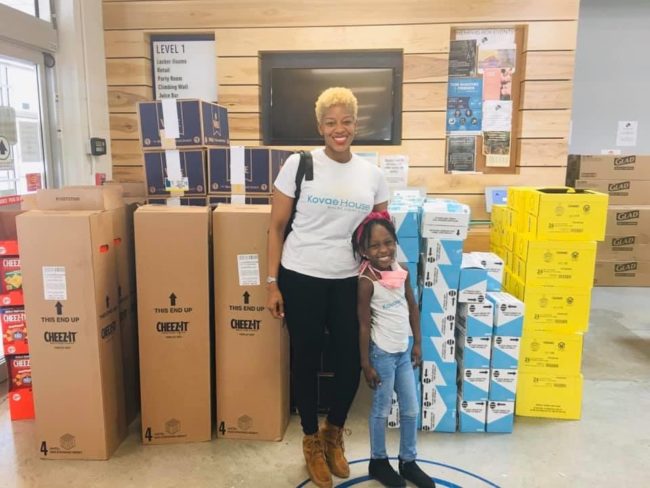
CBJ: Do you have any tips for gyms looking to do similar things in their wider communities?
Arnold: One thing that I lead here that we’re quite proud of is our volunteer program. I recommend starting a volunteer program to give back to the community. One of the big things that we do is we partner with an organization called Memphis City Beautiful. They focus on neighborhood clean-ups, trying to beautify the area. Get into volunteering, giving back to the community. Start with the basics. And climbing gyms that have questions about starting a volunteer program can contact me.
Hawk: And it’s not volunteering at the gym that we’re primarily focused on; it’s volunteering in the city―although volunteering in the gym is an option here, and it’s necessary. Also, just engaging your members. Climbing is about community, and you have to get your community engaged during times of struggle. We couldn’t continue to hand out these free lunches every day without them. Many of our members donated goods for our care packages. The reason we are able to give out so many hygiene packs is because our climbing community stepped up and chipped in.
Arnold: There were several individual people that made larger donations, but there was no distinctive donation that was applied. It was probably a collaboration of 20-25 local climbers who are regulars in our gym bringing in what they could―just a little bit here and there. And that was able to do a lot more, combining all those small efforts together.
CBJ: It was eye-opening to see the COVID Racial Data Tracker and read how COVID-19 is impacting communities of color. How can gyms still keep diversity, equity and inclusion in mind right now?
Hawk: I think that DEI should remain a major goal for climbing gyms, but we all need to make sure every guest and employee is doing everything they can to limit the chance of spreading the virus, especially to those more vulnerable. Community is not just about recreation and staying fit. It’s also about having a warm belly full of food if you can’t afford it. That’s one of the things that drew me to this project in the beginning and something we continued from day one of this period. We need to keep in mind the basic principles of climbing: community, mentorship and helping each other overcome obstacles.
Arnold: I feel like the word “community” gets distorted sometimes and we end up focusing on just our immediate communities. When we talk about community, we often don’t mean the community in which our gyms are situated, we just mean the community that comes and hangs out at the gym. And that is something we’re trying to change.
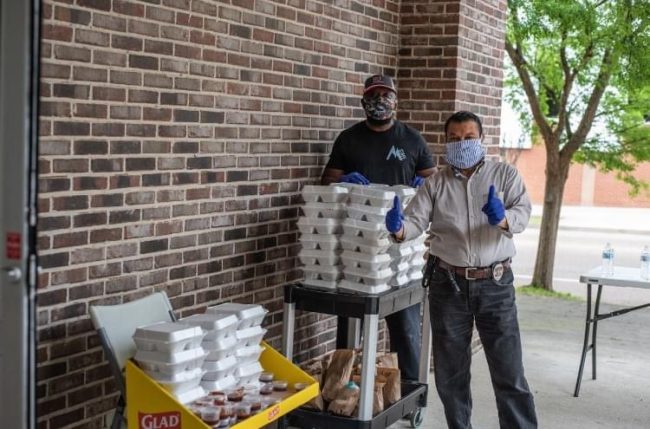
CBJ: What are some of the protective measures you are taking at Memphis Rox upon reopening?
Hawk: We are requiring everyone that enters to wear a mask. We have some custom masks coming in, so we will also be able to provide masks for people who don’t have them. Staff will be wearing the KN95 masks. There are the N95 which are medical grade. The KN95 are the more affordable ones from China that do pretty much the same thing, they just don’t have the official stamp of approval.
We’ll also be doing temperature checks. I have two of the laser thermometers that are no-touch. Obviously, we’re limiting numbers. We haven’t figured out the exact numbers yet, and we’re not doing an overall number. We’re breaking it into sections, so there will be a certain amount of people in the bouldering area, the roped area, the fitness area, etc. We are requiring hand washing or sanitizing upon entrance and exit. We’re changing the traffic pattern. We have an exit-only door so we don’t have too many people crowding in the hallway. Obviously, the six-foot social distancing rule will be in place.
We’re spacing the bouldering routes out too. Probably every ten feet there will be routes and some space in between. There will be a higher turnover rate on the bouldering routes, so people don’t get bored. We’re not allowing anyone to share chalk. We won’t be renting chalk. Monitors will be walking around with a bottle of sanitizer in their hands. We want to encourage sanitizing between each climb. We know that’s not going to happen every time, but we’re going to encourage it by having someone who walks around, asking if they want a squirt. We’re limiting the amount of time that someone can be in. Right now that number is 1.5 hours.
CBJ: Even with gyms reopening, in many ways it feels like the hard times are just beginning. How do you envision your programs for at-risk youth, especially, to continue to be impacted going forward?
Arnold: We have to keep in mind that there’s a large population in our community who are no longer in school now. We are one of the most underserved and impoverished neighborhoods in the country. A lot of people can’t afford memberships. We want to stay true to our mission and our community, so we won’t be limiting our gym to just members when we reopen. If we limit it to just members, then how are these members of the community going to access the gym and have a safe environment to express themselves if we do that?
We also have a plot of land attached to our campus in the back that’s pretty overgrown. We have plans to turn it into an educational food garden for our after-school programs next year. The goal is to teach program participants the whole process of planting, growing and harvesting produce. I hope to in the future also use this concept in our kitchen and teach them how to make healthy meals with the produce that they’re growing.
Hawk: One thing to keep in mind is that this part of the city is considered a food desert. The only actual places to eat other than our juice bar are fast-food or sit-down restaurants, which taste good but are not exactly healthy. So a lot of people don’t have access to fresh fruits and vegetables in this neighborhood.
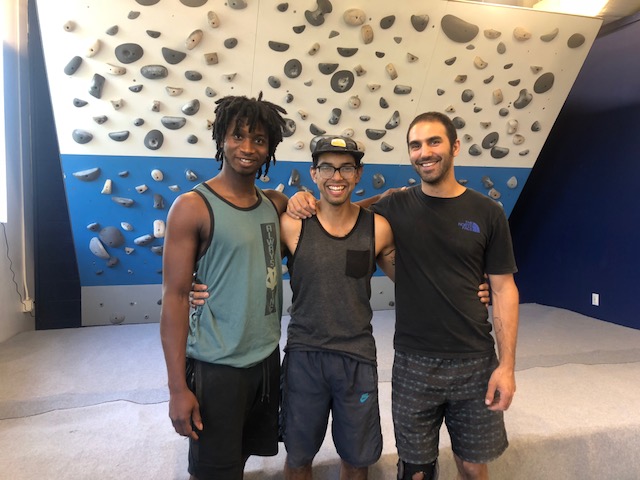
CBJ: The 2020 Solidarity art poster project sounds like a cool way for your local community to donate to Memphis Rox. What is the best way for the wider climbing community to support your work too?
Hawk: I am working on a video chat series with some professional climbers as a fundraiser for the end of June. Meagan Martin and Sam Elias have already fully committed. I wanted the first time that we’re doing this to be climbers who have been here, so they can tell their story about climbing and what it’s meant to them, how it’s a metaphor for life―overcoming obstacles, teamwork, mentorship and trust building―and tying that all together with our mission and what the future of climbing could look like.
We are also creating an online store that has Memphis Rox merch and some really cool items that our routesetters have been making in the woodshop next door. Our head setter, Josh Jimenez, got a big donation of these old skateboard decks, and he cut them up and made holds out of them. With the scrap pieces he’s made bottle openers, candle holders, cell phone holders, and other things like that. They’re always coming up with things that we can sell. Our main routesetters are Josh, Chris Feghali and Tyler Liggins, and they’ve been working hard throughout this whole thing. We had some scrap panels from Walltopia, and last week they put up a new training wall in the gym which looks really good.
But the biggest thing climbers can do is follow our social media, share our posts and ask their friends to donate as well. What I’ve really been trying to work on is engaging climbers throughout the country, and even the world. If we could get just $1 per month from 10,000 climbers, imagine the people we could help with that. And for most people, a couple dollars per month, you don’t even notice it.
Share your story
Are you leading a climbing gym or brand through this unprecedented period? Or, do you work in the industry and have a story that others could benefit from hearing? If so, please contact us and tell us about it.
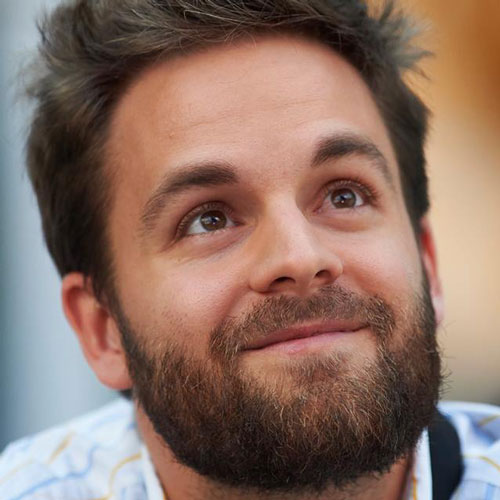
Joe Robinson has been working in the climbing industry for over a decade and currently manages CBJ editorial. He traveled the world as the IFSC’s community manager during Olympic inclusion and across the U.S. while writing for Alpinist, Climberism, DPM and CBJ. He also worked in local climbing gyms of the Pacific Northwest and West Michigan while advancing economic empowerment, educational equity, youth development and diversity programs of national nonprofit organizations.




